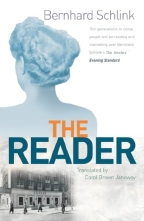The Reader
Bernhard Schlink
Phoenix
UK Mass Market Paperback
ISBN: 0753804700
224 Pages; £6.99
Date Reviewed: 01-17-2004
Reviewed by: Serena Trowbridge © 2004

REFERENCES
COLUMNS
|
|
|
The ReaderBernhard SchlinkPhoenixUK Mass Market PaperbackISBN: 0753804700224 Pages; £6.99Date Reviewed: 01-17-2004Reviewed by: Serena Trowbridge © 2004 |
|
|
REFERENCES |
COLUMNS |
There are some books you know will stay with you forever, and Bernhard Schlink's The Reader is definitely one of them. It has been highly critically acclaimed, winning the Boston Book Review's Fisk Fiction Prize, and it deserves all the praise it has received. I didn't intend to read it - a friend left it on my bookshelf and I grabbed it for something to read on the train, but I wouldn't have missed it for the world.
The Holocaust is a difficult, though much covered, subject matter, and this novel has a sure touch and an appealing lack of judgement with it. The story begins in the world of almost-childhood of fourteen-year-old Michael Berg, recovering from a summer of hepatitis, begins a relationship with Hanna, a much older woman he meets by chance. The first part of the novel, untouched by the shadow of the recent war or Germany's disturbed and dangerous past, deals with Michael and Hanna's burgeoning relationship, and the little fears and worries that can make up one big problem. Eventually, as we know it must, their relationship ends and Hanna moves away.
When the book moves on to the second part, the tone has changed considerably. Michael, now a law student, attends the trial of female Nazi war criminals. To his shock, one is Hanna, who had been a camp guard at Auschwitz. I won't say more for fear of spoiling it for you, but the Holocaust is seriously considered in the light of philosophy and moral responsibility. There is an attitude that one becomes numb to the horror of it all if too exposed to it, and this book does not go into ghastly detail, but rather examines even more painful details: who was to blame, how do we live with the suffering, how can one atone, and most of all, what is the next generation to do?
It also looks at what it means to love someone, how much we can accept of them and how blind we can be to those we love. Love and guilt both feature prominently in this novel.
In many ways Hanna was innocent, and yet it becomes apparent that she lived every day with terrible guilt; Michael was a victim of her actions, and yet he too is guilty by association. The reader of the title is Michael, who read to Hanna during the early part of the relationship; the reader is Hanna, alone in prison occupying herself by learning about the experiences of camp inmates. The reader is selected individuals in the camps who read aloud to Hanna, and may have died because of it. But most of all, the reader is ourselves; the title points the finger at us, because now we have the knowledge, what should we do with it? If all it takes for evil to prevail is for the good to remain silent, then how innocent are any of us? And how can we deal with the subsequent guilt? There are so many layers to this subtly complex novel that having just finished it, I have to start it again. The transforming power of words is negated by their ultimate futility, and actions in this novel speak deafeningly loud.
If we have a responsibility towards the past, to learn from it, and I believe we do, then this book will help us to go some way towards fulfilling it.